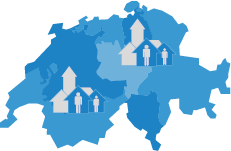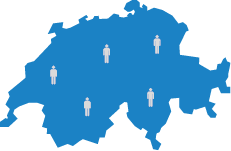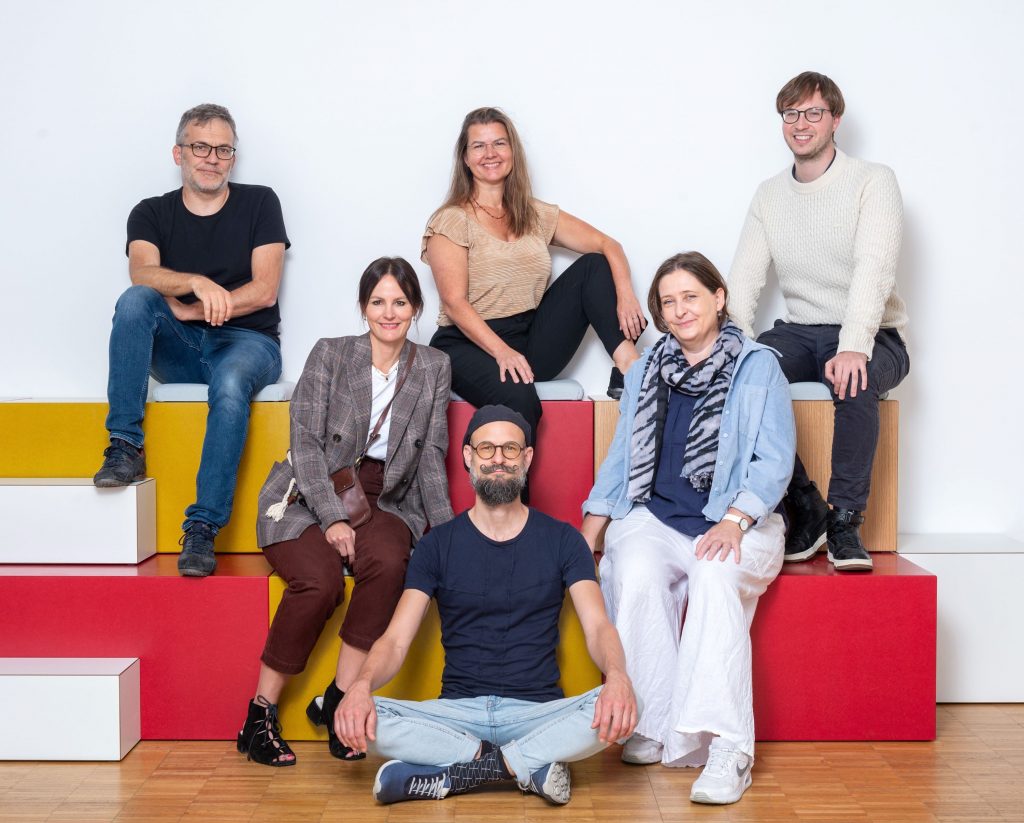

MOSAiCH aligns its survey topics with the annual theme of the International Social Survey Programme, covering 12 topics crucial for the social sciences:
- Role of Government
- Social Inequality
- Social Networks and Social Resources
- Family and Changing Gender Roles
- Work Orientations
- Religion
- Environment
- National Identity
- Citizenship
- Leisure Time and Sports
- Health and Health Care
- Digital Societies
MOSAiCH is an annual, self-administered survey (online/paper) with respondents drawn from a probabilistic sample representing the Swiss population aged 18 and over. The survey is conducted in two parts: the first part includes the current module of the International Social Survey Programme (ISSP) and is supplemented with socio-demographic questions, while the second part consists of one or two follow-up surveys featuring Switzerland-specific questions determined through a public call.
- Critical Social Issues: MOSAiCH data covers a wide spectrum of social issues, including government responsibilities, civil rights and duties, health care experiences, religious practices, environmental attitudes and concerns, work-life balance, social inequalities, national identification, and many more.
- Analysis of Social Change: Researchers can analyze changes in social attitudes and behaviors over time.
- Cross-Country Comparisons: Enables comparisons with other ISSP country datasets.
Accessibility:
- Free Access: Data is available free of charge, accessible to researchers and the public.
- Research Tool for Scholars: The annual call for question contributions provides researchers with a valuable tool for collecting representative data for their research projects. This data is also freely accessible to the wider scientific public.
MOSAiCH stands for Measurement and Observation of Social Attitudes in Switzerland (CH)
MOSAiCH is financed by the Swiss National Science Foundation (SNSF). The survey is organized and coordinated by FORS, the Swiss Center of Expertise in the Social Sciences.
Under the scientific direction of Michèle Ernst Staehli, the International Surveys team at FORS plans and executes the following steps of the survey process:
- Overall planning and organization of the survey
- Sample drawing for Switzerland
- Development of specific survey methods
- Translation of the ISSP questionnaire module from English into Swiss national languages (French, German, and Italian)
- Development of the Swiss section of the questionnaire
- Cleaning, documenting, and processing MOSAiCH data for use by researchers and other interested parties
Coordination of the International Social Survey Programme (ISSP)
The ISSP is a cross-national collaboration programme that coordinates and conducts annual surveys on relevant social science topics. Established in 1984 by its founding members Australia, Germany, Great Britain and the US, the ISSP (www.issp.org) now counts more than 40 member countries. Since its foundation, over one million respondents from all around the globe have participated in ISSP surveys.
The ISSP is organised mainly by a rotating Secretariat, a Drafting group for modules that decides on the annual topics and a Methodology Committee that is responsible for quality specifications and assurance. The General Meeting – consisting of all the member states – develops the source questionnaire, appoints the members of the working groups and makes strategic decisions.
In the past years, FORS (representing Switzerland) has been strongly involved in various ISSP working groups. At present, FORS is in charge of the ISSP Secretariat (2021-2027) and is actively represented in several ISSP research groups (non-response, mixed-mode, translation, weighting, demographics). Additionally, FORS was a member of the Drafting Group that prepared the “Social Networks and Social Resources” module for the 2017 edition of the ISSP, and will be a member of the Drafting Group again for the 2027 edition of the same module.
The respondents are drawn from a probabilistic sample representing the countries’ population from the age of 18. A net sample size of at least 1,000 respondents is required. Since 2010, MOSAiCH is considered a survey of national importance to Switzerland, which means that a sample of individuals can be drawn randomly from the sampling register of the Swiss Federal Statistical Office, in accordance with Art. 13c, para. 2, lett. d, of the Ordinance on the Execution of Federal Statistical Surveys dated 30 June 1993.
Sample design:

- Sample of postal codes representing all regions of Switzerland
- Selection of a specified number of households from each of the sampled postal codes
- Random drawing of one person from each household

- The MOSAiCH survey sample design is, since 2010, based on a simple random selection of individuals on national level, without stratification.
- Until 2017, MOSAiCH was conducted every two years as a face-to-face survey.
- Since 2018, data collection has been carried out once a year through self-administered questionnaires (web/paper).
- The survey consists of a main questionnaire followed by one or two shorter follow-up surveys (study2 and study3).
- Target net sample size for the follow-up interviews: 1000 respondents.
In order to enhance the quality of the data, the methodical procedure is constantly adapted and improved. Among other things, these measures include a rigorous translation procedure for the questionnaire (TRAPD), optimised random sampling and extensive measures to increase the response rate.
From 1999 to 2003, Switzerland conducted selected modules of the European Commission’s Eurobarometer Survey (in the first year as an independent survey, from 2000 to 2003 in combination with the ISSP). The modules of this Europe-wide survey were complemented by additional questions that focus primarily on the Swiss population’s attitudes and opinions towards national institutions and the European Union. These additional questions are gathered primarily in the modules EBCH – Swiss politics and EBCH – Relationship EU-CH.
While the Eurobarometer (EB) was discontinued in Switzerland in 2003, a considerable number of the EBCH questions has been incorporated into the MOSAiCH project (2005-2017). The document Vue d’ensemble des questions de l’Eurobaromètre en Suisse provides an overview of the repeated questions coming from EBCH as well as other sociodemographic and attitudinal questions of general interest and their implementation in different survey projects from 1999 until now.
Since 2018, the EBCH questions are only included in the MOSAiCH survey on a selective basis, depending on the specific subject of the ISSP module.
The data from the Swiss section in particular are very popular with researchers working in Switzerland, as they accurately reflect the social context in our country. A list of MOSAiCH-ISSP-Swiss publications enumerates publications based on MOSAiCH data and Swiss ISSP data. For more specific searches by topic or author, you can also access the Zotero bibliographic database.
Some results of previous surveys:
Some selected results from previous surveys can be found in the following brochures (survey years 2009-2015) and in our data blog.
Publications with MOSAiCH and Swiss ISSP data
You can search the bibliographic database for title and author:
If you have worked with MOSAiCH or Swiss ISSP data and miss your publication in this list, or if you want to announce a new publication, please send the complete reference to Michele.ErnstStaehli@fors.unil.ch. Thank you for your collaboration.
The MOSAiCH CALL FOR QUESTION CONTRIBUTIONS offers researchers in Switzerland a unique opportunity to collect representative data on current social issues free of charge.
Just published:
MOSAiCH Call 2027 – with a thematic focus on “Social Networks and Social Resources”
We invite researchers to propose questions for the second part of the MOSAiCH Survey 2027, which will thematically complement the ISSP 2027 Social Networks and Social Resources II module. Successful submissions will be fielded in spring 2027, with data available in early 2028.
The deadline for submissions is Monday, April 20, 2026.
All relevant information on the current call for question contributions can be found here: MOSAiCH Call 2027
To review the specific evaluation criteria, please refer to: Evaluation Criteria 2027
Scientific Commission
The MOSAiCH Scientific Commission guarantees the strong embedding of MOSAiCH within the Swiss research community and authorities involved in research in the social sciences. The Commission is mandated by the FORS Foundation Board. According to its mandate, the Commission’s purpose is to guarantee the quality of the Swiss part of the research project and to strengthen the research network in the social sciences at Swiss universities and concerned authorities.
Members:
- Prof. Bart Meuleman (KU Leuven, Belgium), Chair
- Prof. Kaspar Burger (Universität Zürich)
- Prof. Laurie Corna (SUPSI, Lugano)
- Prof. Axel Franzen (Universität Bern)
- Prof. Eva Green (Université de Lausanne)
- Prof. Anita Manatschal (Université de Neuchâtel)
- Prof. Stephanie Steinmetz (Université de Lausanne)
- Prof. Boris Wernli (FORS)
Project Directors:
Dr. Michèle Ernst Stähli and Dr. Marlène Sapin (FORS, Lausanne)
Previous calls:
- Call for question contributions MOSAiCH/ISSP 2026
- Call for question contributions MOSAiCH/ISSP 2025
- Call for question contributions MOSAiCH/ISSP 2024
- Call for question contributions MOSAiCH/ISSP 2023
- Call for question contributions MOSAiCH/ISSP 2022
- Call for question contributions MOSAiCH/ISSP 2021
- Call for question contributions MOSAiCH/ISSP 2020
- Call for question contributions MOSAiCH/ISSP 2019
- Call for question contributions MOSAiCH/ISSP 2018
- Call for question contributions MOSAiCH/ISSP 2017
- Call for question contributions MOSAiCH/ISSP 2015
- Call for question contributions MOSAiCH/ISSP 2013




 Bâtiment Géopolis,
Bâtiment Géopolis, +41 (0)21 692 37 30
+41 (0)21 692 37 30

